Thought of the fortnight: ‘What have you done to improve diversity and inclusion in your institution at a senior level’
Number 5 in a series of blogs composed from a range of members’ experiences, ideas and opinions ‘crowd-sourced’ on a specific fortnightly topic.


Despite significant progress across the sector on diversifying gender in senior administration and operations leadership roles, we have not seen the progress we would want in some other areas of diversity. In particular, we have not yet seen a significant change in the number of people who are black/global majority/Diaspora in senior leadership roles, perhaps particularly in areas of operations and administration.
The Association has been trying to prioritise work in this area. This year we created bursaries for people of colour to join the Aspiring Registrars and COO’s Programme, we have commissioned a piece of research to be produced with Nottingham Business School looking at barriers and enablers for people of colour in senior professional services roles that will report back in 2025. We have supported the work of the Higher Diversity Coalition and we have expanded our reciprocal mentoring pilot.
We know it’s not just the Association that is trying to deliver tangible change, it’s also our members and institutions. Here are some of the initiatives and work of AHUA members:
‘We have added an additional member to our Academic Board and each of its sub-committees (Research Committee, Quality and Standards Committee, Education Committee). These additional members are drawn from groups under-represented among our committee membership. We have been clear that all members of the committees are responsible for EDI activity – i.e. the onus is not on this additional member to bring up EDI matters. The aim of the initiative is to increase diversity of thought and representation on senior academic committees’
‘We have been keeping a close eye on the impact of the changes made to the processes for needs assessments and DSA funding. We are starting to see a very detrimental impact on students as the new system takes hold. There are concerns from an equality perspective. Costs are also falling onto the University more than before.
I saw that Wonkhe ran an article on this last week and I know that UUK is collating evidence about issues, but wondered if other institutions are seeing a detrimental impact and whether there is more we should be doing to get this issue some more exposure?’
– We’ve signed up to and vigorously participated in Athena Swan.
– We’ve changed key members of our senior team, when the opportunity has arisen, to improve our diversity mix. It’s brought different perspectives, styles, ideas and opinions to the institution.
– But there is a challenge for the sector – if academic reputations are dependent on citations, can the sector not develop a way for citations to be assessed on an anonymous basis? If we accept the idea of unconscious basis, which I absolutely do, the citation process, which is key to our research activity, must have unconscious bias running through it.
(The last one might be a bit controversial, but I’ve never understood why we don’t talk about it).
‘For a long time skills audits of boards and committees have been standard practice but more recently we have started to include diversity audits of these groups as well. Giving the same significance to the diversity of backgrounds that makes up a decision-making body that we give to the skills felt like a huge step but now seems very natural and we have seen real benefits.’
– Created a role of APVC role for EDI that sits on the University Leadership Team
– Created a lead member role for Council on EDI
– Ensured all policies/papers have an equality impact assessment in all committees (including the University Leadership Team) and papers cannot go forward without it.
These measures mean that we are considering EDI in all of our decision-making at the senior level, and considering the impact on all groups when making a decision. However, we still struggle to increase diversity on our University Council – though we’ve worked through our alumni network to try and bring in younger and more diverse voices which has borne some fruit!
The challenges on diversity are deep-rooted and multi-faceted and will require concerted effort and leadership from the association and its members. The rewards of delivering real change are worth the challenge. Greater diversity will offer equity and fairness as well as bringing in new talent, new ways of working, new innovation and a stronger community.
We can’t allow diversity to be simply an aspiration, it should be an imperative.
Related Blogs



